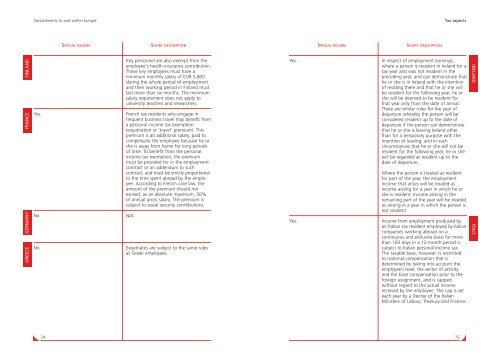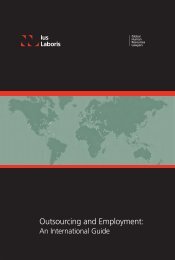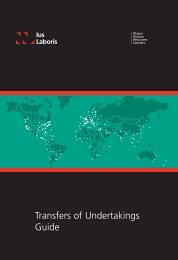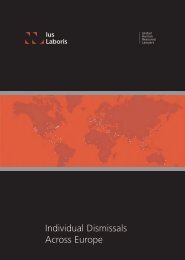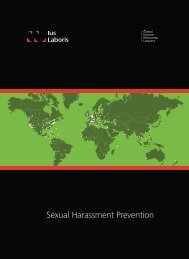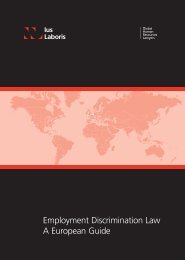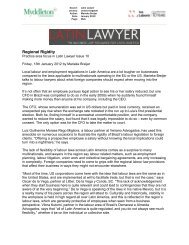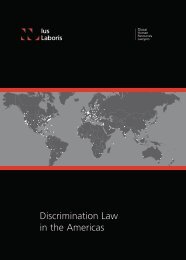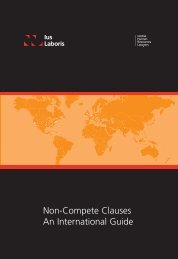Secondments to and within Europe - Ius Laboris
Secondments to and within Europe - Ius Laboris
Secondments to and within Europe - Ius Laboris
Create successful ePaper yourself
Turn your PDF publications into a flip-book with our unique Google optimized e-Paper software.
<strong>Secondments</strong> <strong>to</strong> <strong>and</strong> <strong>within</strong> <strong>Europe</strong><br />
Tax aspects<br />
SPECIAL REGIME<br />
SHORT DESCRIPTION<br />
SPECIAL REGIME<br />
SHORT DESCRIPTION<br />
GREECE GERMANY<br />
FRANCE<br />
FINLAND<br />
Yes.<br />
No.<br />
No.<br />
Key personnel are also exempt from the<br />
employee's health insurance contribution.<br />
These key employees must have a<br />
minimum monthly salary of EUR 5,800<br />
during the whole period of employment<br />
<strong>and</strong> their working period in Finl<strong>and</strong> must<br />
last more than six months. The minimum<br />
salary requirement does not apply <strong>to</strong><br />
university teachers <strong>and</strong> researchers.<br />
French tax residents who engage in<br />
frequent business travel may benefit from<br />
a personal income tax exemption<br />
(expatriation or ‘travel’ premium). This<br />
premium is an additional salary, paid <strong>to</strong><br />
compensate the employee because he or<br />
she is away from home for long periods<br />
of time. To benefit from the personal<br />
income tax exemption, the premium<br />
must be provided for in the employment<br />
contract or an addendum <strong>to</strong> such<br />
contract, <strong>and</strong> must be strictly proportional<br />
<strong>to</strong> the time spent abroad by the employee.<br />
According <strong>to</strong> French case law, the<br />
amount of the premium should not<br />
exceed, as an absolute maximum, 30%<br />
of annual gross salary. The premium is<br />
subject <strong>to</strong> social security contributions.<br />
N/A.<br />
Expatriates are subject <strong>to</strong> the same rules<br />
as Greek employees.<br />
Yes.<br />
Yes.<br />
In respect of employment earnings,<br />
where a person is resident in Irel<strong>and</strong> for a<br />
tax year <strong>and</strong> was not resident in the<br />
preceding year, <strong>and</strong> can demonstrate that<br />
he or she is in Irel<strong>and</strong> with the intention<br />
of residing there <strong>and</strong> that he or she will<br />
be resident for the following year, he or<br />
she will be deemed <strong>to</strong> be resident for<br />
that year only from the date of arrival.<br />
There are similar rules for the year of<br />
departure whereby the person will be<br />
considered resident up <strong>to</strong> the date of<br />
departure if the person can demonstrate<br />
that he or she is leaving Irel<strong>and</strong> other<br />
than for a temporary purpose with the<br />
intention of leaving, <strong>and</strong> in such<br />
circumstances that he or she will not be<br />
resident for the following year, he or she<br />
will be regarded as resident up <strong>to</strong> the<br />
date of departure.<br />
Where the person is treated as resident<br />
for part of the year, the employment<br />
income that arises will be treated as<br />
income arising for a year in which he or<br />
she is resident. Income arising in the<br />
remaining part of the year will be treated<br />
as arising in a year in which the person is<br />
not resident.<br />
Income from employment produced by<br />
an Italian tax resident employed by Italian<br />
companies working abroad on a<br />
continuous <strong>and</strong> exclusive basis for more<br />
than 183 days in a 12-month period is<br />
subject <strong>to</strong> Italian personal income tax.<br />
The taxable base, however, is restricted<br />
<strong>to</strong> notional compensation that is<br />
determined by taking in<strong>to</strong> account the<br />
employee’s level, the sec<strong>to</strong>r of activity<br />
<strong>and</strong> the base compensation prior <strong>to</strong> the<br />
foreign assignment, <strong>and</strong> is capped<br />
without regard <strong>to</strong> the actual income<br />
received by the employee. The cap is set<br />
each year by a Decree of the Italian<br />
Ministers of Labour, Treasury <strong>and</strong> Finance.<br />
IRELAND ITALY<br />
74<br />
75


